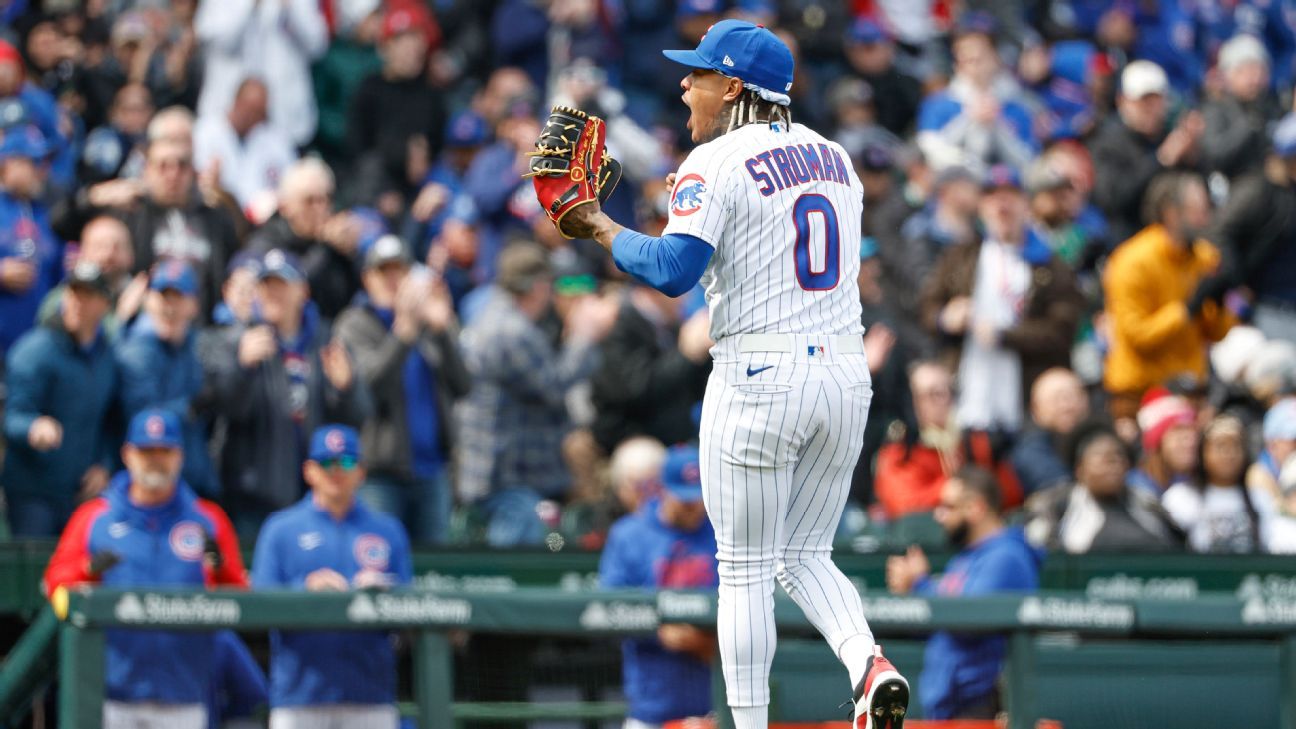CHICAGO — Cubs starter Marcus Stroman was called for a pitch clock violation during the third inning of Chicago’s season-opening 4-0 win over Milwaukee on Thursday, making him the first player to be penalized under the new rule during a regular-season game.
Stroman took his place in baseball’s history book for this oddity when he took too long to deliver a 1-2 pitch to the Brewers’ Christian Yelich. Stroman was checking on the Brewers’ Brice Turang, who was on second base, and the clock expired just before Stroman delivered a pitch from the stretch.
“It’s tough, man,” Stroman said. “It’s tough, this pitch clock. It’s a big adjustment. I don’t think people really realize it. It just adds a whole other layer of thinking.”
Joining Stroman in the history book will be home plate umpire Ron Kulpa, who emphatically pointed to the pitch clock and shouted out the violation. Yelich took advantage of the free ball two pitches later by drawing a walk. The Brewers did not score in the inning.
Under the new rules, pitchers have 15 seconds to deliver a pitch with the bases empty and 20 seconds if a runner is on base. The penalty for a pitcher running out of time is an automatic ball.
While the majority of big league pitchers were able to get mostly acclimated to the new clock during spring training, Stroman had a limited opportunity to do so because of his participation in the World Baseball Classic, pitching for Puerto Rico.
Tasked with making his first Opening Day start as a member of the Cubs, Stroman had plenty on his plate without the new rules. A routine-oriented pitcher who mixes up his pace depending on the game situation, Stroman says the pitch clock is a complicating factor for sure and one that might throw some pitchers off.
“I do feel super rushed at times,” Stroman said. “Even between innings. I’m running out there very early to warm up in between. A foul comes up and you don’t even have time to rub the [new] ball up.
“And I’m a big breather. Sometimes I’m not able to catch my breath and find my proper breathing that I do before pre-pitch. It’s definitely been a dynamic that’s going to be tough on some guys.”
Stroman recovered from the penalty just fine, earning the win over the Brewers and ace righty Corbin Burnes. Stroman threw six shutout innings in one of his better outings since joining Chicago as a free agent before the 2022 season.
It was a memorable day, given the pomp of a Wrigley Field opener, but because of the historic nature of that first pitch clock faux pas, it’s an outing that will be immortalized in the collection of the Baseball Hall of Fame in Cooperstown, New York, which will seek a relic from the game to mark the occasion.
That means Stroman is headed for the Hall of Fame, albeit for a reason that he didn’t exactly dream about. Still, that’s not what he is most going to remember from the festive, chilly afternoon at the Friendly Confines.
“These are the moments it’s so hard to replicate,” Stroman said. “So I’m very grateful and thankful to have been in this moment, to have the opening day start and to go out there and get the win in front of the incredible home crowd. I’m just excited and happy to be here.”
In another first on Opening Day, Boston Red Sox third baseman Rafael Devers made history by becoming the first player to strike out on a pitch clock violation. Leading off the eighth inning with Boston down 10-4, Devers was looking down and kicking his cleats when umpire Lance Barksdale called the violation.
The violation happened with a runner in scoring position, and with Boston coming back in the ninth inning to bring the score within a run, 10-9, the strikeout could have affected the game’s outcome.
“There’s no excuses,” Cora said. “They know the rules. We know the rules.”
Orioles outfielder Austin Hays became the first hitter called for a pitch clock violation, doing so in the fifth inning against the Red Sox. Shortly after, J.D. Davis of the San Francisco Giants did the same in the ninth inning of a game at Yankee Stadium. Davis took too long getting into the box to begin an at-bat against Ron Marinaccio, prompting plate ump Laz Diaz to penalize him with an automatic strike. Davis went on to strike out.
A few minutes later, Atlanta Braves reliever Collin McHugh put his arms out wide after being called for a violation by umpire Dan Bellino in the eighth inning against the Washington Nationals. That put batter Jeimer Candelario ahead 1-0, and McHugh followed up with three more balls — a three-pitch walk, essentially.
“I didn’t even realize it happened, quite honestly,” Atlanta manager Brian Snitker said. “It’s going to happen.”
New York Mets All-Star Jeff McNeil was angered by a violation called by plate umpire Larry Vanover in the sixth inning against the Miami Marlins. McNeil was waiting for baserunner Pete Alonso to retreat to first after a foul ball when Vanover dinged him for an automatic strike. That prompted an argument with McNeil and Mets manager Buck Showalter, who seemed irritated the pitch clock began before Alonso returned to first.
It worked out for McNeil — he grounded an RBI single a few pitches later.
ESPN’s Joon Lee and The Associated Press contributed to this report.
